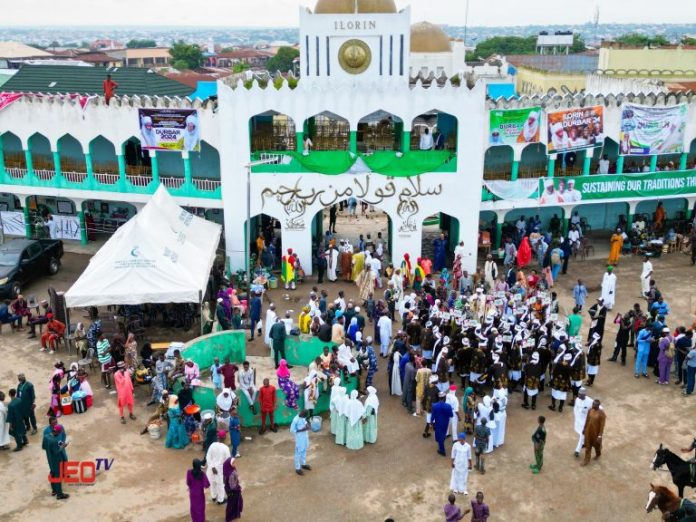On June 18, 2024, the vibrant city of Ilorin celebrated its annual Eid-el-Kabir with the traditional Ilorin Durbar Festival.
This cultural event, featuring an array of traditional clothing, dances, songs, and other displays, is an integral part of the Eid-el-Kabir festivities.
The Emir of Ilorin took part in the celebrations, engaging with the community across the city.
However, the festival has ignited a spirited debate about the origins and cultural identity of Ilorin and its people, with reactions from Nigerians reflecting a spectrum of emotions ranging from pride to confusion and controversy.
One Facebook user, Awoyemi Emmanuel Segun, expressed a sense of loss and frustration: “Fulani has finally taken over the land from the rightful owner, the Yorubas.” This sentiment points to a broader historical contention about the ethnic and cultural ownership of Ilorin, highlighting the complex interplay of Yoruba and Fulani influences in the region.
In contrast, Habeeb Olaitan celebrated the festival, saying, “Glory be to ALLAH.
This is our culture.” Olaitan’s comment reflects a pride in the cultural practices and a sense of belonging to the Islamic traditions that are part of the festival.
Olayinka Saheed shared a similar sense of pride: “We’re so proud of our heritage.” Saheed’s statement underscores the festival as a moment of cultural affirmation for many Ilorin residents.
Conversely, Aladoro Daniel raised a critical question about land ownership and identity: “Who owns the land?” This question taps into the ongoing debate about historical claims and the rightful cultural and ethnic stewards of Ilorin.
Adeton Plc offered a scathing critique of the socio-economic conditions and the focus on cultural celebrations amidst poverty: “Their Traditional rulers and politicians already looted their future. See poverty everywhere, just pure cameras.
The youth who suppose to step up for their rights are busy with Arab ancestors’ culture.
This is happiness in stupidity. Palace beat an ordinary person’s house in Lagos mainland.” Adeton’s comment highlights the tension between cultural pride and socio-economic realities, suggesting that the festival may distract from more pressing issues.
The confusion about the state’s ethnic identity was articulated by Okoliko ThankGod Ugbede: “Are Kwara people Fulanis or Hausas? Nawaooooo.” This reflects a common perception of Kwara State’s complex cultural makeup, where Yoruba, Fulani, and Hausa influences converge.
Expressing local pride, Ibrahim Abdulrasheed and Ismail Adepeju both declared their love for Ilorin’s heritage. Abdulrasheed stated, “Our culture, our pride. Proudly Ilorite,” while Adepeju echoed, “I’m proud of my heritage, proudly Ilorite.” Their statements emphasize a strong local identity and pride in the cultural festivities.
Muyideen Yakub blessed the emirate with his comment: “God bless Ilorin emirate,” reflecting a sense of reverence and support for the traditional leadership.
In contrast, Bamidele Ifeoluwa Karim expressed his disappointment: “Is a shame seeing a Fulani man leading the Yoruba race in Yoruba land.” Karim’s statement touches on the broader ethnic tensions and the perceived incongruity of Fulani leadership in a predominantly Yoruba region.
Chibueze Nwosu Ododo criticized the educational system for erasing history: “E no go better for anybody that removed HISTORY from our secondary school. Imagine Afonja descendants celebrating Durbar in his land.” Ododo’s remark suggests that a lack of historical education contributes to the current cultural and identity confusion.
Oluwole Sunday highlighted the complexity of Kwara State’s identity: “Kwara is the most confusing state in Nigeria. We don’t know if they are Yorubas or Hausas.” This underscores the multifaceted cultural landscape of the state.
Sirr Chigbogu defended African culture: “And some fools said that Africans are cultureless,” highlighting the richness of African traditions contrary to any notions of cultural inferiority. Emmanuel Orji and Uzoma Chiwendu Onwuasoanya echoed concerns about cultural takeover, with Orji stating, “So Fulani don finally collect this state from Yoruba hand,” and Onwuasoanya adding, “Fulani has taken Ilorin in Yoruba land nawa ooo.” Their comments reflect a perceived cultural and political encroachment.
Ohagwu Christian remarked on the changing cultural dynamics: “Fulani taking over Yoruba land in grand style. Nothing like the Ilorin Durbar Festival. Yoruba no get Oba of Ilorin ooo na emir they get that means Fulani na them get Ilorin.” Christian’s comment underscores the perceived shift in cultural and traditional leadership.
The Ilorin Durbar Festival remains a significant cultural event, celebrating and preserving traditions. However, it also brings to the forefront ongoing debates about cultural identity, heritage, and historical narratives within Kwara State. As the festival continues to grow in prominence, so too does the conversation about what it represents for the people of Ilorin and their diverse cultural landscape.




